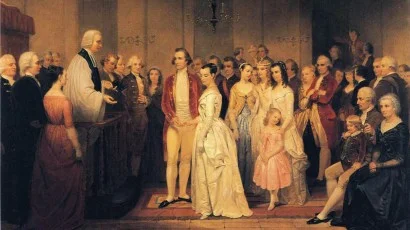“Your Entire George Washington”
This is how General George Washington signed a letter to his wife Martha on June 23, 1775, an elegant phrase laced alluringly with surrender and vulnerability. However, records – and centuries of gossip– draw attention to a beautiful woman in Washington’s past. Her name is Sally Cary Fairfax.
In 1758, during the French and Indian War, 27 year-old Washington had just become engaged to Martha Custis. On September 12th he had written a letter to Sally Fairfax, the daughter-in-law of the wealthy and influential Colonel William Fairfax, whom young Washington had looked up to as a mentor and benefactor. Good neighbors and friends, young Washington had spent much time with the Fairfaxes and Sally at their Belvoir plantation.
In this letter, Washington calls himself a “votary” (or devotee) “to love” and acknowledges that “a Lady is in the Case.” He goes on to describe “the recollection of a thousand tender passages” he wishes he could forget, and speaks of a destiny that divides him from the object of his love. Historians have long speculated that Washington was referring to himself and Sally. However, as she was the wife of close friend George William Fairfax, and due to his own approaching marriage, love between them was impossible.
George William and Sally Fairfax’s childless marriage was likely a typical 18th-century union of convenience, arranged by class distinction and wealth rather than one’s heart. One could argue that the Washingtons’ marri

We are often left to perceive Washington as an old man wizened by war and the brushstrokes of nationalism; seldom as he was in youth – excitable, robust, athletic, and much charmed by women. Washington devotees rightfully want to keep the General unsullied and untainted by scandal and the impropriety of addressing such romantic insinuations to another man’s wife. To many, the idea of George Washington having feelings for a married woman is discomforting.
However, before we ascribe blame, here’s what the letter is not: an open declaration of love. It’s also devoid of any specifics that would mar his reputation, or Sally’s. It also did not ignore or denigrate his intended bride, Martha. In fact, Washington openly mentions his fiancée in the letter and even describes “possessing Mrs. Custis” as an “animating prospect”.
Despite the centuries of gossip and speculation, could it be possible that Washington bittersweetly and impulsively wrote to a woman he once loved, similar to declaring lasting affection to a high school sweetheart? Is it inconceivable that Washington (or any man or woman throughout history) could be attracted to a person he could not be with, and straining against the conventions of the time, was bursting to let that person know?
There is a difference between fantasy and reality, and Washington was aware of both. He very well might have felt an ardent love for Sally, but even as a young man he was practical. His honor mattered. This letter, although expressive, only obliquely references love. Washington knew anything else would prove injurious to his reputation.
Whether or not Sally

While the lovely Sally may have been placed upon the pedestals of idealization and nostalgia, Martha Washington took the form of beauty on the front lines. She offered him a sense of stability, traveling to be with her husband in wartime and bearing the horrors of camp life with grace and dignity. She was his confidante, his balm, his safe space.
Beautiful in her own right, a Polish nobleman described Martha Washington in later years, “she was at one time one of the most beautiful women in America and today there remains something extremely agreeable and attractive about her.” Others spoke of her character. A good friend of the Washingtons, Mercy Otis Warren, offered “the benevolence of her heart, and her affability, candor and gentleness qualify her to soften the hours of private life or sweeten the care of the Hero and smooth the rugged scenes of war.”
Washington ends his June 23, 1775 letter to Martha with another intimate stroke: “I retain an unalterable affection for you, which neither time nor distance can change.”
Here’s what we do know: Washington was capable of both great passion, and integrity.
George Washington to Sally Cary Fairfax, September 12, 1758
Susan Dwight Bliss autograph collection, MS Fr 167 (57), Houghton Library, Harvard University.
Sources:
Henriques, Peter R. Realistic Visionary: A Portrait of George Washington. Charlottesville: U of Virginia, 2006. Print.
Lengel, Edward G. Inventing George Washington: America's Founder, in Myth and Memory. New York: Harper, 2011. Print.
Washington the Love Poet
Before Sally Fairfax and Martha Dandridge Custis, a young George Washington wrote love poems for another young lady in an expedition journal.
Learn more